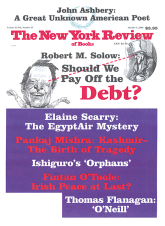To the Editors:
Writing of the Irish city of Limerick in his portmanteau review of Frank McCourt’s books [“Not-So-Great Expectations,” NYR, May 25], Julian Moynahan says: “Then there is the dark episode in the city’s history when its defenders, in 1690, were overwhelmed by the Williamites.”
I should think a better candidate for Limerick’s dark episode would be the anti-Semitic pogrom of 1904, the last such incident in the British Isles. “The incident began when a priest used the pulpit to attack Jews. He called Jewish peddlers and merchants ‘leeches’ who were sucking the blood of the Irish by overcharging or tricking the poor. The priest called for a boycott of Jewish merchants, and the town complied. Within a few years, virtually all of Limerick’s 25 Jewish families and the rabbi had left.” (Natalie Weinstein in the Jewish Bulletin, www.jewishsf.com/bk980605/sfalife.htm.)
A leading supporter of the pogrom was Arthur Griffith, who in 1900 had founded Cumann na nGaedheal, which in 1907 became Sinn Fein, the first and last of the twentieth century’s racist-nationalist-fascist movements. Griffith was a strong anti-Semite: he wrote in 1899 that Jews, Freemasons, and pirates were the “three evil influences” of the nineteenth century and that Jews “detested soap and water.”
As I remember the story—there was a BBC documentary about it some years ago—the Jews of Limerick originated in Russia. An unscrupulous sea captain had promised them passage to America; but he dumped them on the coast of Ireland near Limerick, telling them that New York was “just up the road.”
Neither of Frank McCourt’s books mentions the Limerick pogrom.
John Derbyshire
Huntington, New York
This Issue
October 5, 2000



